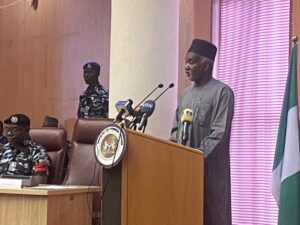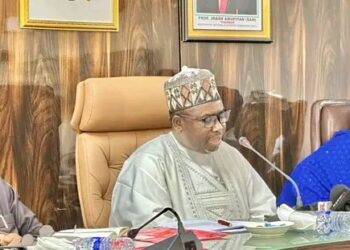The Federal Government has called on the diplomatic community in the country to shun interference in the ongoing nationwide protests.
It also called for collaborative support from the community in tackling economic challenges and ensuring better life for Nigerians at home and abroad.
The Minister of Foreign Affairs, Amb. Yusuf Tuggar, disclosed this on Wednesday in Abuja, at the briefing of Members of the Diplomatic Corps on the programme and policies of the government.
Tuggar who spoke on the aftermath of the protests said Nigeria is a country under the rule of law and assured that the government would do all it can to protect its citizenry.
According to him, no one can tolerate the thuggish behaviour of fringe elements and those who stand behind them, restating that government will not tolerate foreign interference in the protests.
“While government continues to work hard through various reforms to address challenges facing Nigeria and Nigerians, it is pertinent that no nation tolerates foreign interference in its domestic affairs and its citizens.
“Government will take appropriate action against any foreign entity residing in Nigeria found to have directly or indirectly supported protesters by whatever means or seeks to interfere in the internal affairs.
“Nigeria cherishes and will continue to value the cordial relationships that happily subsist between her, your countries and organisations and will not do anything to undermine or take for granted such relationships.
“Indeed, more than any time before now, we solicit your understanding and collaboration in the ongoing efforts of the government in addressing the economic challenges confronting the country.
“To achieve a better life for every Nigerian at home and abroad,” Tuggar said.
He reassured the diplomats that President Bola Tinubu understands the pains and frustrations driving the protests and had commiserated with the
families, and relations of those who died and promising to address concerns of Nigerians.
The minister restated Tinubu’s appeal particularly to youths, advising them not to let violence and destruction tear the country apart as willingness to proffer solutions to issues that surround the protests.
He recounted that Tinubu had led a campaign against military dictatorship in Nigeria in the 1990s and believes in Nigeria’s democracy that freedom of assembly, freedom of expression and the right to dissent are fundamental.
Tuggar said, “While admitting there have been many dashed hopes in the past, Tinubu affirmed Nigeria is in a new era of Renewed Hope as the government is working hard.
“The results will soon be visible and concrete for everyone to see, feel, and enjoy. Consequently, the President has directed that the security operatives continue to maintain peace, law, and order in the country as the safety and security of all Nigerians is paramount.
In his remarks, Mr Mohammed Idris, the Minister of Information and National Orientation, said the government recognised and upholds democratic rights of Nigerians to freely express their grievances, and demands accountability from their governments.
According to him, since the advent of this administration, the government has maintained an open-door policy where citizens are regularly briefed on the policy direction of the government.
Idris said, “President Tinubu did not come to office to cause hardship or make life difficult for Nigerians.
“He has come to office with bold solutions to historical problems with determination to correct many poor policies and dysfunctional choices that have held us back as a nation for decades.
“When the first notices emerged that a nationwide protest was scheduled for August against the high cost of living, we saw it as an opportunity to engage with the Nigerian people, to listen and enlighten.
“These engagements predated the announcement of the protests. Since the administration came to office we initiated and sustained dialogue with Nigerians on different platforms.
“Such as the regular Ministerial Briefing Sessions, town hall meetings, social media engagements, media appearance and press releases among others.”
He restated that now is not the time for protests, advising that focus should be on allowing the government’s various initiatives and interventions to manifest fully, saying genuine reforms take some time.
Idris identified suspension of import duties and taxes on essential food items, new National Minimum Wage of N70, 000, Local Government autonomy and youth-focused intervention programmes to be among initiatives by the government. (NAN











